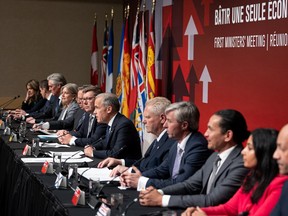John Ivison: Premiers seem delighted just to finally be meeting with a grown-up prime minister

However, she said a million-barrel-a-day pipeline to the northwest coast of British Columbia would generate $20 billion a year in revenue.
“It would be a good value proposition if both projects could proceed at once,” Smith said. “Let’s call it a grand bargain.”
Nobody is holding hands and singing Kumbaya.
One Albertan official said his federal counterparts are “oozing sincerity,” but absent an unequivocal public declaration that overhauls the regulatory regime, industry will not invest in engineering and designs of new projects.
“Past Liberals created this mess; these Liberals don’t want to take advantage of this special moment and make changes,” he said. “There are discussions, but so far, no compromises. It’s early, but not as promising as it could be.”
Still, we are a long way from the days in mid-January, after prime minister Justin Trudeau’s resignation and just before President Donald Trump’s inauguration, when it truly felt that Canada was drifting rudderless towards the falls.
Maybe a more accurate analogy would be the eve of the fall of Saigon. Federal ministers were more focused on their re-election prospects and the Liberal leadership contest than the threat of a trade war, while the bureaucracy downed tools in preparation for a new government.
The lack of a sense of collective mission was apparent in a communiqué from the premiers in January saying they would ensure a robust response to Trump’s tariff threats —a document Danielle Smith refused to sign.

Trump’s modus vivendi — dividing and conquering — was working and there were worries that the centre might not hold.
Five months on, Canada is in a much better place and voters have noticed.
A new poll by Spark Insights suggests two out of three voters approve of the way the federal government is handling its responsibilities, even though current voting intentions remain similar to where they were on election day.
Nearly four in 10 right-of-centre voters agree the government is performing well, as does a small majority of Albertans.
The main reason seems to be personal approval for Mark Carney as prime minister, with voters judging him intelligent, hard-working and likeable. Carney seems to have convinced even many Conservatives that he is in politics for the right reasons, despite being pilloried as being a tax cheat, a radical leftist and an elitist during the election.
Bruce Anderson, Spark’s chairman and a Carney supporter, suggested Canada has become less polarized than many might assume.
“Voters generally won’t dig into the substance of policy choices but they are as astute as hell when it comes to knowing what a clear vision, empathy and honesty looks and sounds like,” he wrote this week.
But it goes beyond a recognition of likeability. I would argue the bipartisan support for the government’s performance is a collective realization that Canada once again has a serious, grown-up government.
Unlike its predecessor, its priorities are almost exclusively economic, not social; its focus is on stability, not its perception of morality; and it is policy-driven, not politically driven.
National Post




